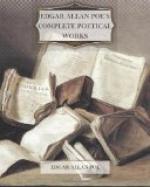“Poe,” says the colonel, “was very fond of the Odes of Horace, and repeated them so often in my hearing that I learned by sound the words of many before I understood their meaning. In the lilting rhythm of the Sapphics and Iambics, his ear, as yet untutored in more complicated harmonies, took special delight. Two odes, in particular, have been humming in my ear all my life since, set to the tune of his recitation:
’Jam satis terris
nivis atque dirce
Grandinis misit Pater, et
rubente,’
And
’Non ebur neque aureum
Mea renidet in dono lacu ar,’
etc.
“I remember that Poe was also a very fine French scholar. Yet, with all his superiorities, he was not the master spirit nor even the favorite of the school. I assign, from my recollection, this place to Howard. Poe, as I recall my impressions now, was self-willed, capricious, inclined to be imperious, and, though of generous impulses, not steadily kind, nor even amiable; and so what he would exact was refused to him. I add another thing which had its influence, I am sure. At the time of which I speak, Richmond was one of the most aristocratic cities on this side of the Atlantic.... A school is, of its nature, democratic; but still boys will unconsciously bear about the odor of their fathers’ notions, good or bad. Of Edgar Poe,” who had then resumed his parental cognomen, “it was known that his parents had been players, and that he was dependent upon the bounty that is bestowed upon an adopted son. All this had the effect of making the boys decline his leadership; and, on looking back on it since, I fancy it gave him a fierceness he would otherwise not have had.”
This last paragraph of Colonel Preston’s recollections cast a suggestive light upon the causes which rendered unhappy the lad’s early life and tended to blight his prospective hopes. Although mixing with members of the best families of the province, and naturally endowed with hereditary and native pride,—fostered by the indulgence of wealth and the consciousness of intellectual superiority,—Edgar Poe was made to feel that his parentage was obscure, and that he himself was dependent upon the charity and caprice of an alien by blood. For many lads these things would have had but little meaning, but to one of Poe’s proud temperament it must have been a source of constant torment, and all allusions to it gall and wormwood. And Mr. Allan was not the man to wean Poe from such festering fancies: as a rule he was proud of the handsome and talented boy, and indulged him in all that wealth could purchase, but at other times he treated him with contumely, and made him feel the bitterness of his position.




